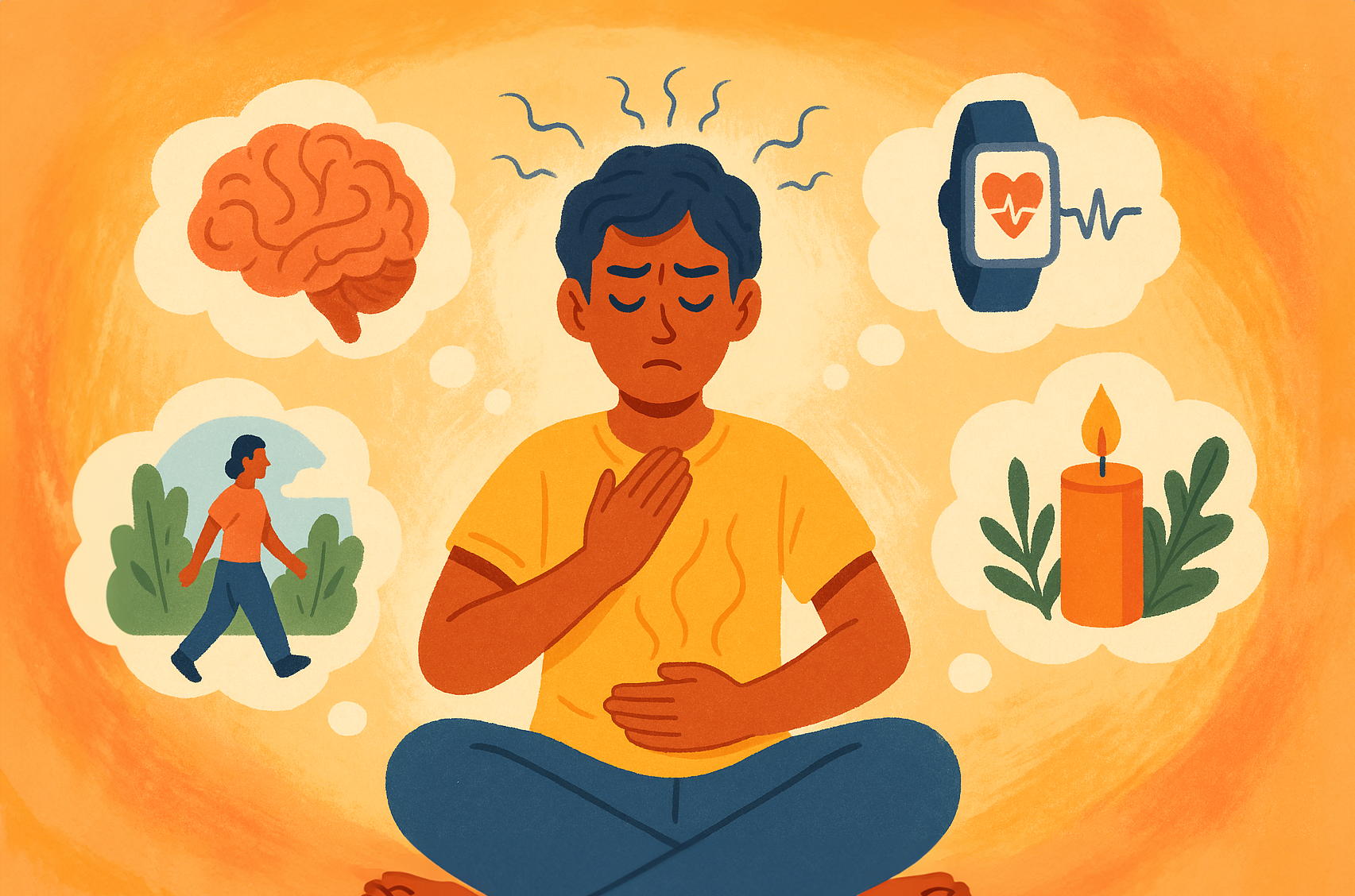
Rylee Lueken
January 15, 2026
•
8 min read

Stress management is one of the most searched mental wellness topics—and for good reason. That racing heartbeat before a test, the sweaty palms in a job interview, or the tight chest after a tough day are all signs your body is responding to stress. While short-term stress can sometimes motivate us to perform, chronic stress takes a serious toll on both mental and physical health.
The American Psychological Association defines stress as "the physiological or psychological response to internal or external stressors". In simple terms, stress is your body's reaction to any challenge or demand.
It isn't always bad. Short bursts of stress can give you the energy to meet deadlines or power through workouts. But when stress becomes chronic, it stops being helpful and starts being harmful.
When your brain perceives a threat, the amygdala sounds the alarm and activates the hypothalamic-pituitary-adrenal (HPA) axis. This chain reaction floods your body with stress hormones like cortisol and adrenaline, which raise heart rate, sharpen alertness, and prepare muscles for action.
This "fight or flight" response is incredibly useful in emergencies, like swerving to avoid a car accident. But if it's switched on constantly—due to school pressure, financial worries, or ongoing conflict—your body never gets the chance to reset. Over time, chronic stress has been linked to weakened immunity, digestive problems, sleep issues, and higher risk for anxiety and depression.
Stress doesn't look the same for everyone. Psychologists usually group it into three main types:
Acute stress: Short-lived and often triggered by immediate challenges, like a big presentation. This is the most common form of stress and usually resolves quickly.
Episodic acute stress: When short-term stressors pile up over and over, creating a cycle of tension—like juggling constant deadlines or frequent conflicts. People experiencing this often feel overwhelmed and always "on edge."
Chronic stress: Long-term and relentless, often tied to ongoing challenges such as caregiving, financial struggles, or toxic environments. This is the most harmful type and requires intentional stress management strategies.
Recognizing which type of stress you're facing is the first step toward managing it effectively.

The good news is that while you can't eliminate stress entirely, you can manage it with evidence-based strategies:
Breathing exercises, meditation, and yoga calm the nervous system and lower stress hormones like cortisol. Even 5-10 minutes daily can make a measurable difference in how your body responds to stress.
Try this: Start with simple box breathing—inhale for 4 counts, hold for 4, exhale for 4, hold for 4. Repeat for 2-3 minutes when you feel tension building.
Physical activity is one of the most effective natural stress relievers. Exercise helps release built-up tension and boosts endorphins that improve mood. You don't need intense workouts—even a 20-minute walk can reduce stress hormones.
Talking with friends, family, or mentors provides comfort and perspective during stressful times. Social connection is a proven buffer against the negative effects of chronic stress.
Prioritizing sleep, balanced meals, and downtime strengthens your resilience against stress. Consistency in these basics gives your body the foundation it needs to handle challenges.
Shifting from "this is impossible" to "this is challenging, but I can handle it" helps reduce the intensity of your body's stress response. This cognitive reframing is a core technique in stress management therapy.
Download Brightn to access guided mindfulness sessions, journaling prompts for reframing challenges, and tools to build daily habits that strengthen resilience. Manage stress in healthier ways—so it fuels growth instead of burnout.

Common physical symptoms of stress include:
If you're experiencing multiple symptoms regularly, it's time to prioritize stress management techniques and consider speaking with a healthcare professional.
Stress itself isn't the enemy. It's a signal from your body that something needs attention. In small bursts, it can push you to focus and take action. But when it becomes constant, it drains energy, impacts health, and narrows joy.
The key is to recognize stress early, give your body time to recover, and practice healthy coping skills. Over time, this builds resilience, helping you handle life's challenges with more balance and strength.
Is stress always bad for you?
No. Short-term stress can be helpful and even protective, but chronic stress without recovery is harmful for your mental and physical health.
What are some physical signs of stress?
Common signs include headaches, muscle tension, upset stomach, rapid heartbeat, fatigue, and trouble sleeping.
Can stress cause long-term health problems?
Yes. Ongoing stress has been linked to weakened immunity, digestive problems, cardiovascular issues, and greater risk for mental health conditions like anxiety and depression.
What's the fastest way to relieve stress?
Deep breathing exercises and brief physical activity are two of the quickest stress relief techniques. Even 2-3 minutes of focused breathing can activate your body's relaxation response.
How does mindfulness help with stress?
Mindfulness practices calm the nervous system, lower cortisol levels, and help you respond to stressors more intentionally rather than reactively.

Brightn helps you turn stress into an opportunity for growth. Inside the app, you'll find:
With Brightn, you can manage stress in healthier ways—building lasting mental wellness one small step at a time.
Download Brightn now to start your stress management journey today.
